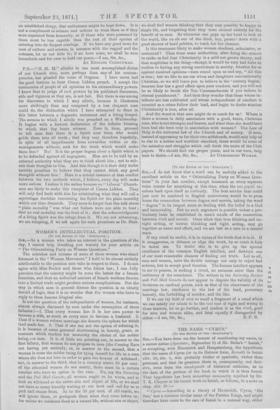WOMEN'S INTELLECTUAL POSITION.
[TO THE EDITOR OF TRIO "SPIUOTA.TOR.1 Sfa,—As a woman who takes an interest in the questions of the day, I cannot help thanking you warmly for your article on "The Orientalizing Party on Woman Questions."
Tho mistakes and excuses of some of those women who stand foremost in the " Woman Movement" I hold to be almost entirely attributable to the position men take in respect to them. I do not agree with Miss Becker and those who follow her ; I can fully perceive that the country might be none the better for a female franchise, and that an unlimited amount of female workers thrown into a limited trade might produce serious complications. But the way in which men in general discuss the question is so utterly devoid of logic, that it is no wonder that the women who have to reply to them become illogical also.
Is not the question of the iudependence of women, for instance, almost always discussed by men under the assumption of three fallacies?-1. That every woman has it in her own power to ,become a wife, as much as every man to become a husband. 2. That if a woman refuses marriage she deserts the sphere for which God made her. 3. That if she has not the option of refusing it, it is because of some personal shortcoming in beauty, grace, or manners which renders her unworthy the choice of the nobler heing,—a man. It is of little use pointing out, in auewer to the first fallacy, that women du not propose to men (the Coming Race not having yet arrived); or, in answer to the second, that a woman is none the nobler being for tying herself for life to a man whom she does not love in order to gain the honour of wifehood ; nor, in answer to the third, that in a country where 80 per cent. of the educated women do not marry, there must be a certain number who have no option in the case. No, say the Saturday and the Pall Mall Gazette, all women ought to be wives, and to look on wifehood as the entire aim and object of life, or we shall not have so many humbly waiting at our beck and call for us to pick and choose from. As to the 30 per cent. of old maids, we will ignore them, or poohpooh them when they come before us ; for uulese we condemn them to a vacant life, without aim or object,
we shall find women thinking that they may possibly be happy in single life, and forgetting that they were created entirely for the benefit of us men. So whenever one pops up her head to look at the world, like an eft out of the ditch, hey, presto ! down with a good shower of hard pebbles, to teach her her element.
Is this treatment likely to make women obedient, submissive, or contented ? Then these same authorities, after doing the utmost to make us feel that Christianity is a mild out-grown theory, and that scepticism is the thing—though it would be very bad form to confess to having any strong convictions in society, whether for or against received opinions—turn round upon us and say, " All this is true ; but we like to see our wives and daughters conventionally Christian, so we will leave you to believe in the ' nursery bogies,' because fear leas a good effect upon your conduct, and you will not be so likely to break the Ten Commandments if you believe in eternal punishment." And then they wonder that those whose in- tellects are lose cultivated and whose independence of conduct is counted as a crime follow their lead, and begin to doubt whether Christianity is true, after all.
And the worst is that men might do so much for us ! Where is there a woman in daily association with a good, brave, Christian man, who is not stronger, and braver, and wiser than she would have been had she been only in association with women ? The Law of Help is the universal law of the Church and of society. If men, instead of oppressing us for their own selfish ends, would only help us to rise to a nobler and worthier standard, there would be none of the mistakes and struggles which call forth the scorn of the Club papers. We should find our proper place, and in our turn, help






























 Previous page
Previous page